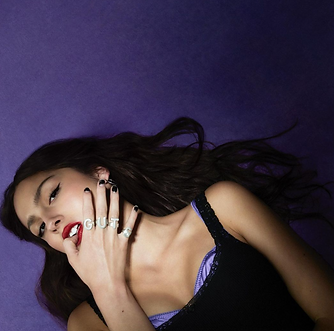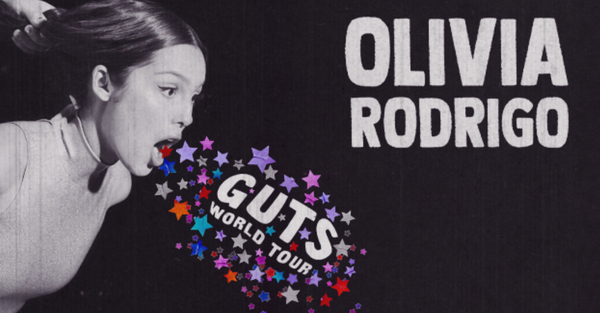A Summary of Womanhood:
Olivia Rodrigo's "Pretty Isn't Pretty"
by Abigail Merzel
Who is Olivia Rodrigo?

Velez, Zamar. "Olivia Rodrigo." Billboard.

Rodrigo, Olivia. "GUTS Album Cover." Instagram.
Olivia Rodrigo has become a pop icon over the past two years, with some of her famous songs being “Driver’s License” and “Good 4 U,” which were released back in 2021. Rodrigo’s claim to fame did not start with her music, as she is also an actress. One of her first gigs was back in 2015 when she starred in “Gracie Stirs Up Success,” an American Girl doll film. Since then, Rodrigo has been seen on Disney Channel shows, such as “Bizaardvark” and “High School Musical: The Musical: The Series” and even in one episode of the hit TV show “New Girl.” After receiving an immense amount of positive feedback from her first single, “Driver’s License,” Olivia Rodrigo has shifted her focus on the music industry, amassing nearly 63 million monthly listeners on Spotify. However, she does not stop there. As of September 23, 2023, Olivia Rodrigo reached the Number 1 spot on the Billboard Artist 100 chart. With the release of her most recent album, GUTS, it is safe to say that Rodrigo is a hot commodity right now.
One song in particular from the new GUTS album is “Pretty isn’t Pretty,” where Rodrigo reflects on the pressures felt by women imposed by society. This song is an emotional take on how societal norms of female physical expectations can take a toll on our minds as young women. She creates the narrative of a girl (who could be herself) living in an ever-changing society blinded by the media’s expectations of beauty. This scenario is not unfamiliar to most women. Societal pressures and beauty standards have circulated in the media for decades for both younger and older women to see. This can create a sense of self-consciousness and low self-esteem because many girls want to look like or be like an unrealistic image. Even some of the most popular celebrities, like Rodrigo, experience this pain in their own lives — though sometimes they are the ones that others want to be like. The competition that society ingrains into the minds of women from a young age is one of the most prominent issues that feminism tries to challenge. Olivia Rodrigo is very young – 19 years old, to be exact – and is a frequent user of social media. Being in the spotlight of social media herself, Rodrigo shares her experiences with self-comparison and self-confidence through this song.
How Pathos & Irony Work Together
For starters, the title, “Pretty isn’t Pretty” is an ironic take on the idea that being pretty is not enough to feel beautiful. Essentially, even the prettiest girl cannot feel pretty because society imposes the idea that there is always someone or something more beautiful, pitting women against one another to feel secure in themselves. With the constant change in the beauty standard, it seems as though women will never be enough for society. While Olivia Rodrigo fits the beauty standard, she too feels defeated by the patriarchy and the pressures placed upon us (women) to be desirable enough for others. There is always something “better,” and that is what Rodrigo implies through her sardonic title. This song fits perfectly into the theme of this album, GUTS because in one interview, Rodrigo stated that she chose the word “guts,” to symbolize how this album is a representation of her “pouring her guts out” to the world. In other words, many of the songs on this record are vulnerable and personal to Rodrigo and she conveys many struggles such as heartbreak and self-confidence. So, “Pretty isn’t Pretty,” is Rodrigo’s way of telling the world that she experiences the same issues that the rest of us suffer with. This analysis will dive into several feminist rhetorical strategies throughout the song and how Rodrigo employs feminism to portray the idea of the pressures put on women through societal beauty standards.
Furthermore, there are a plethora of lyrics in the song that employ several feminist rhetorical strategies. Rodrigo utilizes pathos many times throughout her song. It is worth noting the chorus:
When pretty isn’t pretty enough, what do you do?/
And everybody’s keepin’ it up, so you think it’s you./
I could change up my body and change up my face/
I could try a new lipstick in every shade/
But I’d always feel the same/
‘Cause pretty isn’t pretty enough anyway.
Rodrigo illustrates how she does not feel beautiful enough for society while also addressing the issues of the media and society in line, “and everybody’s keepin’ it up, so you think it’s you.” As discussed previously, Rodrigo feels as though she cannot keep up with the constant change in beauty standards and she feels defeated in feeling worthy of beauty. This employment of pathos tugs at the heartstrings of the audience, both due to how relatable the feeling is and the sorrow for Olivia. It creates a sense of connection between both groups of people because it illustrates the idea that no matter who you are, we are all equally affected by society. Another section of the song that carries this theme is as follows, “You can win the battle, but you’ll never win the war/You fix the things you hated, and you’d still feel so insecure.” In other words, it feels like a never-ending cycle of insecurity living in a world that puts so much emphasis on perfection and beauty. Rodrigo pulls in evidence for this claim by writing:
It’s on the poster on the wall, it’s in the sh*tty magazines/
It’s in my phone, it’s in my head, it’s in the boys I bring to bed/
It’s all around, it’s all the time, I don’t know why I even try.
The suffocating nature of the media plastering and promoting the beauty standard is inescapable. To tie all of this into Ronald and Ritchie’s ideas of rhetoric, Olivia Rodrigo can be classified as a feminist rhetor because her songwriting, particularly in this song, “Appeals to experience, to irony, and on the constant assertion of their own ethos. Create a ‘women’s language.’ Create new styles and forms ‘in order to break out of the confines of a rhetorical tradition that they believe reinscribes women in powerless and silent positions’” (Ronald and Ritchie, xxii). The lyrics in “Pretty isn’t Pretty” appeal to the experiences of societal pressures and insecurity that many women face. Furthermore, Rodrigo utilizes songwriting as her style choice because it is her way of expressing herself in the best way she knows how. However, as Ronald and Ritchie mention, “It’s not black and white. Feminist rhetorics still draw from “traditional methods” (xvii), and “Each context demands different appeals, form, evidence, and rhetorical ethos” (xxiii). Rodrigo works with rhetorical methods such as symbolism, metaphor, imagery, irony, and pathos to construct her songs in a way that they still convey a certain message for the audience to take in.

Rodrigo, Olivia. "GUTS World Tour." TicketMaster.
An Appeal to the Experiences of Womanhood
Continuing, Rodrigo uses specific diction throughout her writing to illustrate the experiences of womanhood. She writes, “You can win the battle, but you’ll never win the war.” The “battle” and “war” are hyperboles of insecurities and the pressures to feel beautiful enough for society. While no one is physically going into a battlefield, this choice of words perfectly portrays how it feels to be a woman in today’s society. There is a constant uphill battle to feel good enough and to live up to the beauty standard, even when you don’t realize it. Rodrigo is a teenage girl herself, and she writes very relatable music that appeals to the experiences shared by most. Ronald and Ritchie state that feminist rhetors, “Refute, correct, and revise depictions of womanhood that have placed women in inferior, vilified, and stigmatized positions” (xxv) and that is exactly what Rodrigo does in “Pretty isn’t Pretty” by utilizing different types of irony to portray womanhood. Another line that relates to this is, “And I try to ignore it, but it’s everythin’ I see.” In a literal sense, Rodrigo is physically able to see other things, but this statement is a metaphorical take on girlhood and womanhood. As mentioned previously, “Pretty isn’t Pretty” is a song that depicts the struggles of insecurity and societal pressure that are put on women. When Rodrigo writes, “It’s everythin’ I see,'' she is trying to portray how much these issues affect her on a day-to-day basis and it is as if it is the only thing on her mind. Whether you read magazines, use social media, or consume any other type of media, there is a high chance that you will encounter images or scripts that contribute to pushing the traditional beauty standard. It seems inescapable and inevitable. Although Olivia Rodrigo is famous, she is a teenage girl who has similar experiences to the average girl. The first verse of the song encapsulates these (sadly) common struggles, as Olivia writes:
Bought a bunch of makeup, tryna cover up my face.
I started to skip lunch, stopped eatin' cake on birthdays/
I bought a new prescription to try and stay calm/
'Cause there's always somethin' missin'/
There's always somethin' in the mirror that I think looks wrong.
While these examples seem extreme, they are very real and ordinary issues that teenage and adult women face. By including this verse and the examples within it, Rodrigo is depicting the reality of womanhood and the consequences of seeing unrealistic beauty standards being perpetuated on social media. The detriment of one's mental health and self-image is a significant repercussion, and she wants the audience to be able to relate to and understand what "Pretty isn't Pretty" is about.

Rodrigo, Olivia. "GUTS Photoshoot." Instagram.
Conclusion
To conclude, Rodrigo’s song not only depicts common struggles of insecurity and pressures that young women feel from societal standards, but it also reinforces the relatability of these issues that many women have experienced. The song ends with the line, “Pretty isn’t,” and the audience is left with an unfinished thought from Rodrigo. In a way, she is implying to the audience that she does not know what “pretty” means or is anymore. If pretty isn’t pretty, then what is it? How does one define the term “pretty” in today’s society? Rodrigo leaves it up to the audience to discover what it might be for themselves, and this unfinished sentence can serve as a reminder to shut out group pressures from society because there are different interpretations of beauty. All of this is conveyed through Rodrigo’s employment of pathos, irony, and an appeal to the experience of womanhood, which are great examples of feminist rhetoric. As women, we hold the right to decide our values. While the patriarchy pushes the beauty standard, it is our job to combat these harmful rhetorics and promote positivity and self-worth to women everywhere. After analyzing this song, I have broadened my understanding of feminist rhetoric in many ways. For one thing, choosing a song allowed me to see rhetoric being used in a way other than a novel or speech. Now, I can understand and analyze music in a new way that I had not thought of before. Secondly, this analysis has enabled me to recognize different types of feminist rhetorical strategies. Finally, this analysis holds a certain significance in terms of identifying what it means to be a feminist writer and how feminist rhetoric is used in many forms that we would not recognize at first glance. All in all, the study of this topic further reciprocates the importance of feminism, and Olivia Rodrigo's song is one of many ways we can see it in action.
Listen to "Pretty Isn't Pretty" here!
Works Cited
Dailey, Hannah. “Olivia Rodrigo Reveals New Album ‘guts’ Will Be Heavily Inspired by Rock, but in a ‘Feminine’ Way.” Billboard, 24 Aug. 2023, www.billboard.com/music/pop/olivia-rodrigo-new-album-guts-feminine-rock-1235400054/.
Genius. “Olivia Rodrigo – Pretty Isn’t Pretty.” Genius, genius.com/Olivia-rodrigo-pretty-isnt-pretty-lyrics. Accessed 3 Oct. 2023.
IMDb. “Olivia Rodrigo | Music Artist, Actress, Music Department.” IMDb, IMDb.com, www.imdb.com/name/nm7111120/. Accessed 3 Oct. 2023.
“Olivia Rodrigo’s Guts World Tour: See the Dates and Ticket Info.” Ticketmaster Blog, 22 Sept. 2023, blog.ticketmaster.com/olivia-rodrigo-tour/.
Rodrigo, Olivia. GUTS Photoshoot. Instagram, Daily.Rodrigo, https://www.instagram.com/p/Cwd-p9-ubJE/.
Zellner, Xander. “Olivia Rodrigo Triples up at No. 1 on Artist 100, Hot 100 & Billboard 200 Charts for First Time.” Billboard, 19 Sept. 2023, www.billboard.com/music/chart-beat/olivia-rodrigo-number-1-artist-100-hot-100-billboard-200-charts-1235415871/.